| Spotlight
Children on the Streets
Elita Karim
Photos: Yamin Tauseef Jahangir

'All Smiles' on Universal Children's Day
“What do you want to be when you grow up?”
“An auto driver,” says 8-year-old Ismail softly, peeping through his ruffled hair on his forehead, with his shy eyes. “I want to own an auto rickshaw,” he adds a little more boldly.
“Why?”
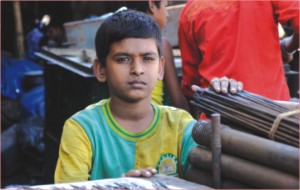 |
| Children have to work to support themselves and their families |
“So that I can go wherever I want to,” answers Ismail. Ismail is one of the many kids selling chocolates and flowers and also begging on the Gulshan 2 traffic signal point. He has lost the use of one of his legs and moves slowly from one place to another with the help of a make-shift support, built with bamboo and taped up with plastic.
The above is an excerpt from a short conversation that Ismail had with one of his customers at the traffic signal in Gulshan last week, while trying to sell her a flower. He along with his friends would rush to the cars and auto rickshaws stopping at the red light and beg for money or try to sell them their items. “I earned 70 takas yesterday,” says Ismail proudly. “Last week, an aapa gave me and my friends clothes!” beams Ismail showing off the tee shirt he is wearing.
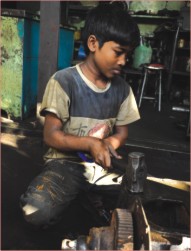 There is no proper survey to be found online or in any of the libraries which could let one know the approximate number of children like Ismail living on the streets trying to survive the harsh life. However, it is clear that thousands of such deprived young children are seen on the streets every day, most of the time going without proper meals. To them, the Universal Children's Day would make very little sense. Even then, this year, organisations and individuals took time out to make them feel like the children that they really are. There is no proper survey to be found online or in any of the libraries which could let one know the approximate number of children like Ismail living on the streets trying to survive the harsh life. However, it is clear that thousands of such deprived young children are seen on the streets every day, most of the time going without proper meals. To them, the Universal Children's Day would make very little sense. Even then, this year, organisations and individuals took time out to make them feel like the children that they really are.
Universal Children's Day was established in 1954. On November 20, the UN General Assembly adopted the 'Declaration of the rights of the children' in 1959, and then later on in 1989. Hence, every year, this day is celebrated on November 20. In countries like India however, children's day is celebrated on November 14, observing the birth anniversary of the country's first Prime Minister Pundit Jawaharlal Nehru. He was said to have had a special place for children and had done a lot for the development of children in India.
This year, the Jaago Foundation had a treat for the children on the streets. They decided to celebrate Universal Children's Day on November 11, instead of November 20, since the city would be almost empty of people due to Eid-Ul-Adha celebrations. The foundation picked up at least a thousand children from 18 traffic signal points in Dhaka city and decided to give them a day off. These children usually spend their days selling flowers, chocolates and other items on the traffic signal points, earning around 80-100 takas a day, if they are lucky. Last week, however, these children were given a free day-entry inside Wonderland, a theme park located in Gulshan. Starting with a delicious breakfast, the kids were let loose inside the theme park. They were seen trying out all the rides until lunch. The children were also entertained with live music on location. “We had done something similar last year as well,” says Korvi Rakshand, the Founder Chairperson of Jaago Foundation. “This year, we had an overwhelming response with at least 2,000 young volunteers ready to help us out on the streets. It was amazing! It shows how much people love Jaago.”
The money that the volunteers will be earning on the streets selling flowers will be distributed in two ways. A portion of it will be given to the street kids trying to survive on the streets, and the rest of the portion will be donated to the Jaago Foundation Education Fund for the school. “We are opening up two more branches in the city and the money will be used towards the development of the schools there.” Currently, there is just one branch of the foundation, which is operating in Rayerbazaar.
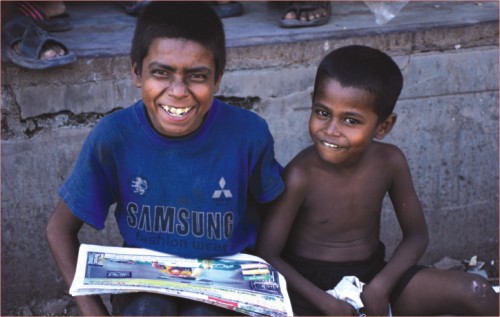 |
| For these children, Universal Children's Day has very little meaning |
Another organisation working towards the development of children in the country is the 1 degree initiative, an organisation run by community activist, Sabhanaz Rashid Diya. A student and photographer by profession, Diya had started this organisation in the hopes of bringing about a difference in the lives of the kids surviving on the streets. “Around 250 volunteers from 1 degree initiative had joined the volunteers from Jaago last week, selling flowers on the streets,” says Diya. “A portion of it will go straight to the education fund run by Jaago Foundation.”
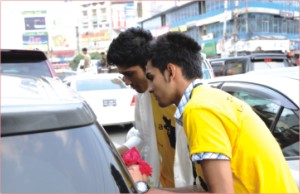 |
| Volunteers from Jaago Foundation selling flowers on the streets |
Not only is this day a special day for the children, it is also a very special day for the parents. Ruksana Sultana Nijhu works in the customer services department of a private company. She plans to take her only son and her brother's daughter out to the nearby park in the evening and then go for ice-cream. “We never get to spend much time with the children,” says Nijhu. “My mother takes care of both the children while we are at work. Sometimes even during weekends, we work or have other social engagements. Children's Day would be a good day for us to spend some quality time as well as, take our children out to the park for some fresh air, which we seldom get to do.”
Mohammad Nurul Amin is a peon working in a private company. He brings tea for the employees working in the cubicles, throws away the waste papers and also gets everyone to sign the monthly registers. He, however, has no idea about the Universal Children's Day. “I try to provide for my children as much as possible,” says Amin. “My son is in class 3 and my daughter is in class 6. I want them to do well in school so that they can get a decent degree and become respectable citizens of the country.”
The number of children on the streets are increasing everyday, which is why, many more individuals and organisations need to come up and address the situation. Clearly, the authorities and the government alone will not be able to take care of such a huge dilemma. Moreover, one should not wait for the Universal Children's Day, to address this issue and spend some time thinking about it. A shout out to the youth out there to build a better and a stronger nation, act now.
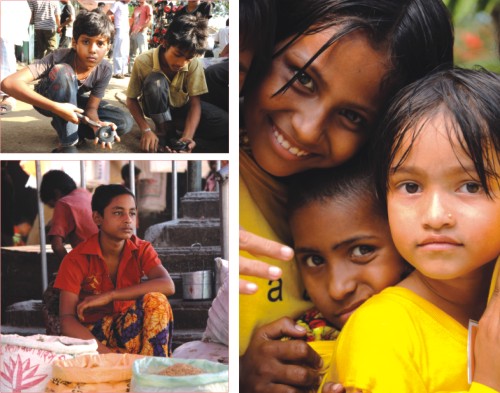
|
Thousands of children live on the streets of Dhaka |
 |
Young domestic workers should be provided with education. More individuals and organisations should come up and address the situation
|
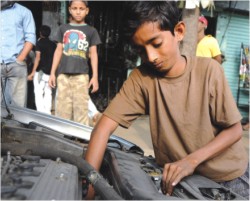 Child Labour Child Labour
One of the major issues that society faces today regarding children is that they are not treated like children. Places where most of them have to work along with adults, many children go through hard labour and have to work in hazardous areas. In many ways, they are treated almost like adults and are exploited when it comes to getting their dues.
Many poor families give up their children to either work as domestic workers in homes or inside factories. This is one of the main reasons behind the increasing dropout rates in schools. After all, realistically, thousands of families in our country still live under the poverty line and depend on their children when it comes to earning. The government is now taking steps to abolish child labour completely.
Even though a commendable act on the government's part, it is still not going to solve the problem. There are several loopholes in the system, which could probably increase the poor person's dilemma instead of solving it. According to the National Child Labour Policy 2007, some of the major reasons behind children working in dangerous and hazardous work places are poverty and lack of education. Poverty is increasing day by day in our country and education comes way down in the list of priorities, especially to those who do not get enough to eat. If Child Labour is finally made illegal in Bangladesh, what are the alternatives that the government plans to provide to the thousands of families who depend on the earnings of their young children?
|
Copyright (R) thedailystar.net 2010 |

